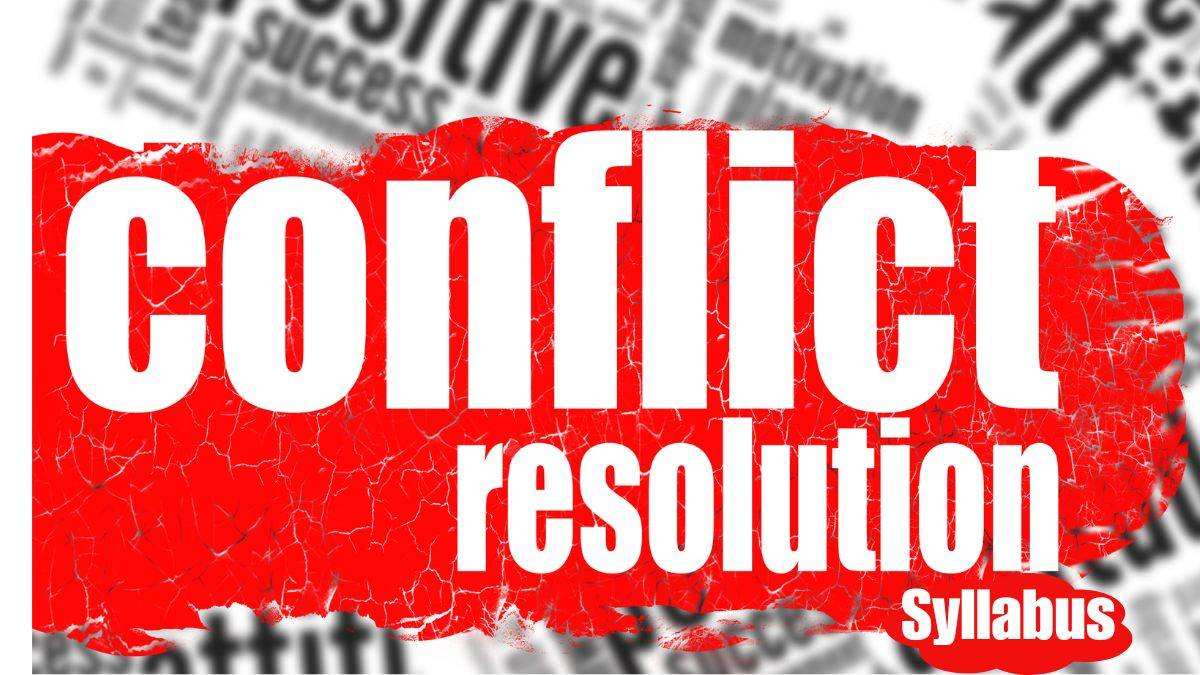Conflict Management syllabus : Latest Updated Syllabus for syllabus

Rashmi KaranManager - Content
The syllabus of conflict management includes topics such as - understanding and resolving disputes effectively, whether in the workplace, educational settings, healthcare, or personal relationships. Here the main focus is on communication skills, negotiation techniques, and resolution strategies, these conflict management courses aim to prepare learners for handling conflicts in various settings, both personal and professional.
Conflict Management Syllabus
Check out the Overview of Conflict Management Syllabus
|
Level |
Course Module |
Description |
|---|---|---|
|
Beginner |
Introduction to Conflict Management |
Overview of conflict, its types, and significance in various contexts. |
|
Understanding Conflict |
Basic theories and models of conflict. |
|
|
Conflict Styles |
Identifying different conflict styles and their impact on resolution. |
|
|
Communication Skills |
Basic communication techniques for effective conflict resolution. |
|
|
Emotional Intelligence |
Introduction to emotional intelligence and its role in managing conflicts. |
|
|
Case Studies and Role-Playing |
Practical exercises and scenarios to apply basic conflict management skills. |
|
|
Intermediate |
Advanced Conflict Theories |
In-depth study of conflict theories and their application in real-world situations. |
|
Negotiation Techniques |
Strategies and techniques for successful negotiation and mediation. |
|
|
Cultural Perspectives in Conflict |
Understanding the role of culture in conflict and strategies for cross-cultural management. |
|
|
Conflict in Teams |
Managing conflicts within teams and organizations. |
|
|
Power Dynamics |
Exploring the role of power in conflict situations. |
|
|
Advanced Communication Strategies |
Techniques for effective communication in high-stakes conflicts. |
|
|
Conflict Resolution Tools and Techniques |
Practical tools and methods for resolving conflicts. |
|
|
Mediation and Facilitation Skills |
Developing skills to mediate and facilitate conflict resolution processes. |
|
|
Advanced |
Leadership and Conflict |
Role of leadership in conflict management and resolution. |
|
Organizational Conflict Management |
Strategies for managing conflict within organizations and institutions. |
|
|
Legal and Ethical Issues |
Legal considerations and ethical dilemmas in conflict resolution. |
|
|
Conflict Management Systems Design |
Designing and implementing systems for conflict management within organizations. |
|
|
Advanced Negotiation and Diplomacy |
High-level negotiation and diplomatic strategies for complex conflicts. |
|
|
Psychological Approaches to Conflict |
Psychological theories and practices in understanding and resolving conflicts. |
|
|
Specialized Conflict Areas |
Conflict management in specialized areas such as family, workplace, and international settings. |
|
|
Capstone Project |
Real-world project to apply advanced conflict management skills and knowledge. |
Source - Multiple external/official sites, data may vary.
- Popular Conflict Management Colleges in India
- Popular Private Conflict Management Colleges in India
- Popular Exams
- Most Popular Courses
- Popular Conflict Management UG Courses
- Popular Conflict Management PG Courses
Popular Conflict Management Colleges in India
Conflict Management Applications open. Apply Now
Popular Private Conflict Management Colleges in India
Conflict Management Applications open. Apply Now
Popular Exams
Jun '26 | CPGET 2026 Notification TENTATIVE |
Jun '26 | CPGET 2026 Registration TENTATIVE |
14 Mar ' 26 | SAT India exam (March attempt) |
17 Apr ' 26 | Last date to apply for May Attempt |
11 May ' 26 - 31 May ' 26 | CUET 2026 Exam |
Jul '26 | CUET UG 2026 Result TENTATIVE |
To Be Notified: | YCMOU 2026 |
To Be Notified: | YCMOU 2026 Admit Card |
Most Popular Courses
Popular Conflict Management PG Courses
PG Courses
- M.A.
2 Colleges
- PG Diploma
1 College
News & Updates
Student Forum
Answered 21 hours ago
By the name it refers to the process of attaining a resolution to different kinds of conflicts. Mostly in a professional setup. Though it is a management concept, it can be used in various areas like teaching, legal disputes, psychology, etc. You can usually find a course in conflict management in a
D
Contributor-Level 10
Taking an Exam? Selecting a College?
Find insights & recommendations on colleges and exams that you won't find anywhere else
On Shiksha, get access to
- 66k Colleges
- 1k Exams
- 686k Reviews
- 1800k Answers

What is effective conflict management?